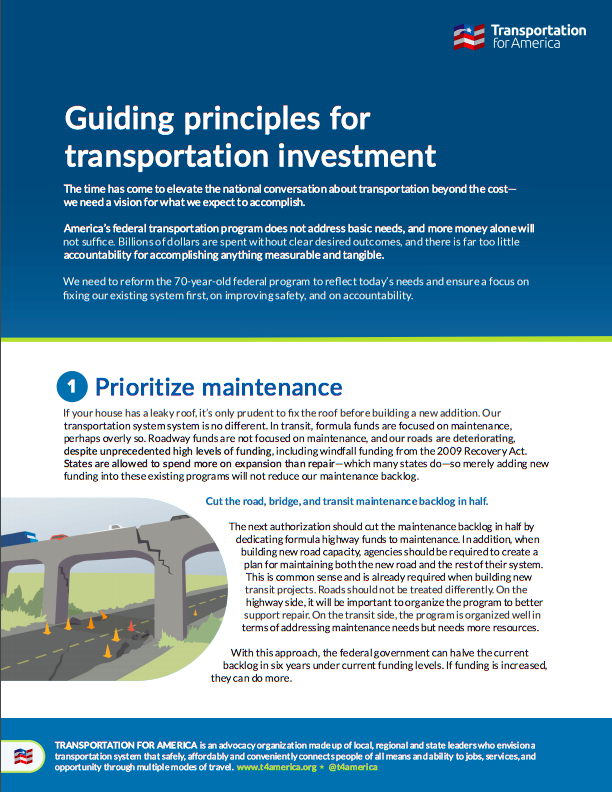Repair Priorities 2019 is here — and it shows that more money won’t fix our infrastructure problems
It’s infrastructure Week again and politicians are back at it, bemoaning our “crumbling roads and bridges” and insisting we must spend more to fix the problem. But we’ve got some cold water to throw on this pity party: Despite more transportation spending over the last decade, the percentage of the roads nationwide in “poor condition” increased from 14 to 20 percent.
New report chronicles how the nation’s road conditions have worsened as many states prioritize expansion instead of repair
WASHINGTON, DC — Repair Priorities 2019, a new report released today by Transportation for America and Taxpayers for Common Sense, shows that, despite more spending, the percentage of the roads nationwide in “poor condition” increased from 14 percent to 20 percent and 37 states saw the percentage of their roads in poor condition increase from 2009-2017.
Did you know that it’s Infrastructure Week once again?
After two solid years of everyone in Washington, DC talking nonstop about a standalone infrastructure bill to pump trillions into America’s infrastructure, we’d understand if you weren’t aware that the last Infrastructure Week ever ended.
Are we creating assets or liabilities?
New roads are often considered new assets, but by ignoring repair many states have let those assets become liabilities—as our upcoming Repair Priorities report shows.
Is repair actually a priority?
While politicians are focused on how much more funding we should give to infrastructure, our upcoming report sheds light on how states are using existing funding for repair vs. new roads and how policy can get the nation back on track.
How TIGER/BUILD can help improve the federal transportation program
The third and final part of our analysis of 10 years of awarding transportation funds competitively through the TIGER/BUILD program illuminates three simple principles that should help guide reform of the federal transportation system.
If verbal gymnastics was an Olympic sport, USDOT would take a medal
A deceptive announcement by USDOT two weeks ago resulted in mistaken headlines across the country giving credit to USDOT and the Federal Transit Administration (FTA) for “awarding” funding to a number of transit projects. A closer read reveals that USDOT didn’t actually distribute or award a single dime to advance new transit projects.
BUILDing a better competitive grant program, in 5 steps
Under President Trump, USDOT has hijacked the TIGER/BUILD competitive grant program, taking it far from its intended function. After a decade of experience with the program there are a number of simple steps that lawmakers could take to get it back on track and even improve it.
Taming the TIGER: Trump turns innovative grant program into another roads program
Under President Trump, the U.S. Department of Transportation has effectively turned the formerly innovative BUILD program—created to advance complex, hard-to-fund projects—into little more than a rural roads program, dramatically undercutting both its intent and utility.
KC Streetcar supports jobs locally and across the U.S.
Last month Transportation for America’s Chairman John Robert Smith traveled to Overland Park, KS to discuss the economic impact of public transportation dollars on local manufacturing jobs with state and local leaders. Local manufacturer Dimensional Innovations (DI) hosted the event at their facility where attendees saw the recently constructed shelters destined for the Kansas City Streetcar. Transit shelters are one part of the transit supply chain with over 20 percent of DI’s business stemming from public transportation.





